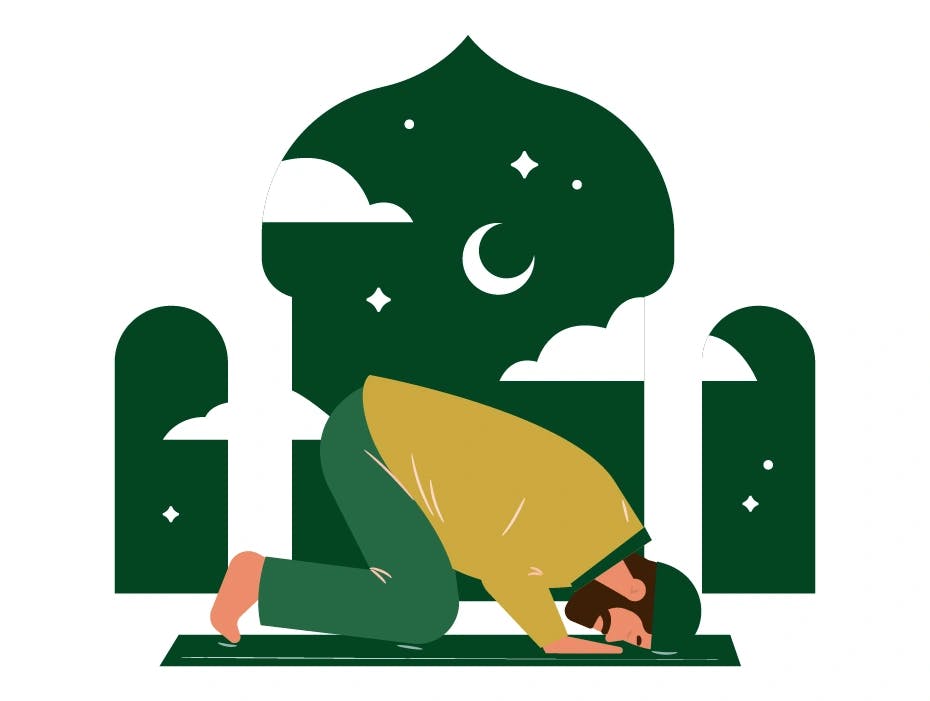
Allah has created countless creatures for a purpose. The primary objective of creation is to know Allah and worship Him. Several verses in the Quran, known as Ayat Sujud, remind humans of their life's purpose. All the sujodd in Quran command the reciters to prostrate to Allah. Prostration in Islam is the act of submitting one’s will to the will of the creator.
Sujood Meaning
‘Sujood’ is an Arabic word that is the plural of ‘Sajdah, ’ which means prostration or bowing in front of Allah. Sujood Meaning in English is prostrarations. This word is used for prostration in prayer and the prostrations mentioned in the Quran.
Types of Sujud in Islam
Prostration in Islam is the main component showing the greatness of Allah. By bowing in front of Allah Almighty, Muslims show that He is the only deity worthy of worship. Besides the prayer prostrations, which are obligatory to offer, there are several other types of sujud in Islam.
Let’s look deep into Islamic prostration.
Obligatory Sajdah
The obligatory sajdah refers to the prostration performed during regular prayers five times a day. The prostration in prayer depends on the number of Rakats in each prayer. Every Rakat of prayer has two sujood, and the prayer can consist of two to four Rakats. Without prostration, prayer can not be regarded as completed. However, there are several occasions when Salah without sujood is acceptable, such as due to physical issues or illness.
Sajdah Shukar
Shukar means thankfulness or gratitude. Sajdah shukar means the prostration of thankfulness and appreciation. Whenever Muslims are blessed or receive pleasing tidings, they express gratitude by bowing in front of Allah. This is a voluntary prostration not everyone is obliged to offer.
Hazrat Abubakar R.A narrates a Hadith that;
“If anything happened to the Prophet (peace of Allah be upon him) that brought him joy or happiness, or if he received glad tidings, he would prostrate in gratitude to Allah”. (At-Tirmidhi, 1578; Abu Dawud, 2774)
Sajdah Sahu
Sajdah Sahu refers to the prostration of forgetfulness, consisting of two prostrations performed after the conclusion of a prayer to compensate for mistakes or omissions during it.
Sajdah Tilawat
Certain verses in the Holy Quran require the reciters and listeners to offer immediate prostration, known as sajdah Tilawat. Those ayats are known as the Ayat Sujud. There are fourteen (fifteen, according to some scholars) verses of prostration in the holy Quran.
Unlike other sajdas, sujood in Quran requires one to perform prostration only once. You do not need to recite tashahud or salam. Recite only Subhana Rabbial Aalaa while prostrating.
Hazrat Umar R.A narrates that;
Whenever the Prophet (SAW) recited the Sura which contained the prostration of recitation, He used to prostrate and then, we, too, would prostrate and some of us did not find a place for prostration. (Sahih al-Bukhari 1079).
List of All the Sujodd in Quran
The Holy Quran has many verses that describe Allah Almighty as worthy of worship, urging the reciters to prostrate. Muslim scholars differ on the number of all the sujodd in Quran. Some scholars consider 14 sajdas, while others consider 15.
- Surah Al A'Raf – Ayat 206
- Surah Al Ra'd–Ayat 15
- Surah Al Nahl –Ayat 50
- Surah Bani Israil –Ayat 109
- Surah Maryum –Ayat 58
- Surah Al Haj – Ayat 18
- Surah Al Haj –Ayat 77 (Shafi)
- Surah Al Furqan – Ayat 60
- Surah Al Naml –Ayat 26
- Surah As Sajdah – Ayat 15
- Surah Sa'd –Ayat 24
- Surah Hamim Sajdah –Ayat 38
- Surah Al Najam –Ayat 62
- Surah Inshiqaq –Ayat 21
- Surah Al Alaq –Ayat 19
Importance of Prostration in Islam
Sajdah is a crucial part of Islamic Salah (prayer). It is a symbol of worship, devotion, respect, and humility. Sajdah is the position when a slave comes nearest to Allah. Prostration in Islam carries high virtues and importance.
Source of Closeness to Allah
Sajdah is a means of submission to Allah. By prostrating, a men submit all his will, emotions, and ego in front of his creator. This act brings humans close to Allah Almighty.
Hazrat Abu Huraira R.A narrates that:
The Messenger of Allah (peace and blessings be upon him) said, “The servant is closest to his Lord during prostration, so increase your supplications therein. (Sahih Muslim 482)
Healing Constricted Hearts
The human heart is filled with desires, emotions, and wishes. These futile desires tilt humans toward materialism and constrict the heart. Prostrations help heal the constricted hearts. The holy Quran says;
“We certainly know that your heart is truly distressed by what they say. So glorify the praises of your Lord and be one of those who always pray”. (Al-Hijr: 97-98)
Acceptance of Prayer
The sujood position ignites humility. It is the way of accepting duas.
Hazrat Ibn Abbas R.A. narrates that the Messenger of Allah (PBUH) said,
“I have been prohibited to recite the Qur’an while bowing or prostrating. As regards owing, exalt the Lord in it, and as to prostration, make supplication with exertion in it, that is worthy of being accepted.”
Conclusion
There are several types of prostration in Islam, including the Quran sujood. Each prostration has certain conditions and occasions. All the sujodd inQuran require the recitor and listener to perform an immediate prostration. The Quranic sujood are the source of humility and devotion.

Take Quran Classes Online
Are you looking to learn the Quran while sitting at your home? Take our online Quran classes. We have comprehensive online Quran courses taught under the supervision of professional Quran tutors.



